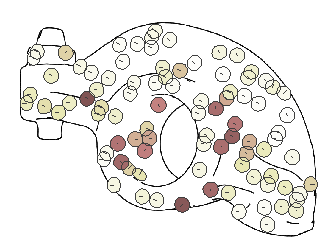How Well Do Line Drawings Depict Shape?
ACM Transactions on Graphics (Proc. SIGGRAPH), August 2009

Abstract
This paper investigates the ability of sparse line drawings to depict 3D
shape. We perform a study in which people are shown an image of one
of twelve 3D objects depicted with one of six styles and asked
to orient a gauge to coincide with the surface normal at
many positions on the object's surface. The normal estimates
are compared with each other and with ground truth data
provided by a registered 3D surface model to analyze accuracy and precision.
The paper describes the design decisions made in collecting a large
data set (275,000 gauge measurements) and provides analysis to answer
questions about how well people interpret shapes from drawings. Our
findings suggest that people interpret certain shapes almost as well
from a line drawing as from a shaded image, that current computer
graphics line drawing techniques can effectively depict shape and even
match the effectiveness of artist's drawings, and that errors in
depiction are often localized and can be traced to particular
properties of the lines used. The data collected for this study
will become a publicly available resource for further studies of
this type.
Files
Links
Citation
Forrester Cole, Kevin Sanik, Doug DeCarlo, Adam Finkelstein, Thomas Funkhouser, Szymon Rusinkiewicz, and Manish Singh.
"How Well Do Line Drawings Depict Shape?"
ACM Transactions on Graphics (Proc. SIGGRAPH) 28(3), August 2009.
BibTeX
@inproceedings{Cole:2009:HWD,
author = "Forrester Cole and Kevin Sanik and Doug DeCarlo and Adam Finkelstein
and Thomas Funkhouser and Szymon Rusinkiewicz and Manish Singh",
title = "How Well Do Line Drawings Depict Shape?",
booktitle = "ACM Transactions on Graphics (Proc. SIGGRAPH)",
year = "2009",
month = aug,
volume = "28",
number = "3"
}